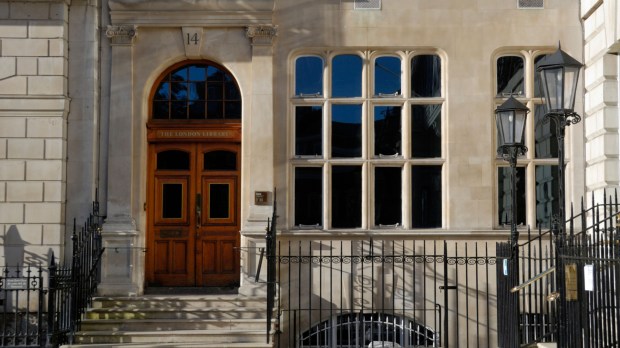The Supreme Court decided rightly on Wednesday, rejecting the Scottish government’s claim that a second referendum on independence was not a ‘reserved matter’. But since it was obvious from the beginning that this was the case, why did Nicola Sturgeon insist on bringing an unwinnable action? Presumably to lay blame, as usual, on UK authorities. The Supreme Court is presented as the enemy of the people, Ms Sturgeon conveniently forgetting that the people, when last asked, voted against independence and may not wish to be asked again in the hope that they will give the ‘right’ answer. The SNP will now claim that the next Scottish parliament election will be amount to the referendum ‘London’ has forbidden. Will this help the SNP? At the risk of being complacent, I suspect not. Scots – like Catalans and Quebeckers – have worked out that it is fun to alarm and milk the central power, but not so much fun to abandon its protection and its money by seceding. Ms Sturgeon is aware of this, but cannot admit it. Her problem is that rather than being midwife to the birth of a nation, she appears ever more like a vexatious litigant.
Labour says it wants to abolish the House of Lords and replace it with an elected assembly representative of the regions. It has had similar policies throughout its history, but never put them into effect. Reform of the House of Lords is possibly the most boring of all subjects because its supporters deliberately avoid the key prior question, which is: ‘What do you want to do with the House of Commons?’ Since (at the latest) 1911, our constitutional arrangements have depended on the idea that the Commons, being elected, is overwhelmingly the more powerful legislative and governmental force. The Lords is an unelected House. If you create an elected second chamber, you create a counter-power to the Commons. If you do that, what are you trying to take away from the Commons, and why? You are asking for trouble. Do you really seek that? If not, you might think a second chamber is better as a rather weak corrective to some of the excesses of the first, and realise that you have got one already. Early this month, Ben Wallace, the Defence Secretary, appeared before a committee of the House of Lords. Lord Alton, a close follower of China’s transgressions, questioned him about a possible rapprochement with China over the fate of Taiwan. Mr Wallace replied: ‘It is in China’s plan to reunify Taiwan to mainland China… it is not a secret. Britain wants a peaceful process towards that.’ Is support for ‘reunification’ really the current policy of HMG? If so, it is a change from its historic position. Mr Wallace seemed to conflate Britain’s long-standing support for China (rather than Taiwan) being recognised as China by the United Nations, with the quite different claim by the Chinese Communist regime that Taiwan should be recognised as part of China. Was this a mistake, or is Rishi Sunak’s shift from describing China as a ‘threat’ to it being merely a ‘challenge’ the harbinger of western wilting in the face of Xi Jinping’s aggressive stance?
Helena Bonham-Carter is to succeed Sir Tim Rice as president of the London Library. She will surely fill this honorific role well: she is well-known, well-read, distinguished. But I must say I was slightly depressed by the terms in which the library (of which I am a long-standing member) announced her appointment. She would be great at reaching ‘new audiences’, it said. Such words are always used by the sort of people who currently run major cultural institutions – the National Trust, for example. Although it is an obvious truth that all audiences should renew, the phrase implies, I think, a criticism of old audiences, as if they (or rather, I admit it, we) are the problem, whereas in fact we are their backbone and pay for virtually everything. I wanted to join the London Library when I was young, not because it engaged in ‘outreach’ and looked like my generation, but because it was venerable, and didn’t. I hoped to see V.S. Pritchett, Isaiah Berlin or Iris Murdoch among the stacks. Even today, a lot of young people think similarly about institutions: they want something to look up to. Besides, the word ‘audiences’ does not fit the London Library. We members are not an audience: we are users. We want to borrow books and read them, not to be offered a performance.
The term ‘mansplaining’ has bothered me. I have felt it was misdefined, but couldn’t quite say why. The problem is solved by my brilliant friend Danielle Crittenden, whose Femsplainers website is a must-read in Washington DC. She recounts overhearing four suburban men lunching together in a restaurant, unaccompanied by women. The one with the loudest voice was explaining how he handled his car on certain turns. ‘I realised,’ Danielle femsplains, ‘that he was making his points in exactly the same way that would be derided as “mansplaining” if he were talking to women. Yet none of his friends seemed offended. Rather, as the conversation unfolded, each one tried to offer his own explanation – his own superior, more-informed explanation. It hit me with the jolt of a cosmic revelation: these men were mansplaining to each other. Then I suddenly understood: “Mansplaining” is not a uniquely sexist act of male condescension and aggression against women. “Mansplaining” is just the way men… speak.’ C’est tous.
Robert Peston tweets: ‘I was taken for lunch to a gentleman’s club today, first time in years, and was barred for wearing incorrect footwear (my comfortable mid-top trainers, perfect for being on my feet all day). It was like going back 50 years. I had to borrow the porter’s spare shoes. 2022.’ As a counter-tweet, someone wrote: ‘Humblebrag of the week.’ This column will leave the last word to Shakespeare: ‘I pray you remember the porter.’
The post MPs won’t ditch the House of Lords appeared first on The Spectator.
Got something to add? Join the discussion and comment below.
Get 10 issues for just $10
Subscribe to The Spectator Australia today for the next 10 magazine issues, plus full online access, for just $10.
You might disagree with half of it, but you’ll enjoy reading all of it. Try your first month for free, then just $2 a week for the remainder of your first year.















Comments
Don't miss out
Join the conversation with other Spectator Australia readers. Subscribe to leave a comment.
SUBSCRIBEAlready a subscriber? Log in